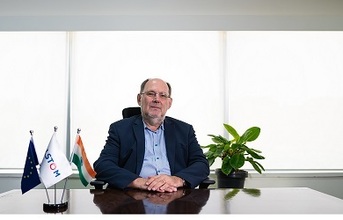
How has the global pandemic impacted your industry and your approach to people?
The pandemic has put a severe strain on the Indian manufacturing industry, which contributes almost 15 percent of the GDP. Reeling under the impact of COVID-19 and the subsequent lockdown, Indian manufacturing industry virtually came to a standstill across the country a few months ago.
However, the Government has taken due cognizance of the situation to enable manufacturing industries to function with reduced capacity and necessary safety guidelines. As we resume with partial withdrawal of the lockdown, the functioning of Railways and Metros becomes critical more than ever to ensure safe movement of people. Our teams are working with customers to help them resume operation and we are confident of honouring all our customer commitments.
As we talk, all our four factories in the country are functional and we have started deliveries of the electric locomotives to Indian Railways from our Madhepura facility. All our sites are maintaining high levels of hygiene and sanitation processes as per government guidelines. Employees who are currently remotely working will continue to do so, until it gets safer to get back to offices.
What are some of the key challenges you've faced in the current scenario and how do you plan to overcome them?
The pandemic has presented us with a host of unique challenges demanding us to be quick and agile. While most of our employees began working from home, it was critical to keep the multi-generational workforce motivated. In order to safeguard the mental and psychological wellbeing of our employees, we have instituted a flexible work culture and introduced initiatives to support remote working.
Even during these unprecedented times, Alstom in India is honouring the commitment made to all its new recruits, by onboarding them as per agreed timelines. Adapting to the new normal and leveraging technology, Alstom has transformed its onboarding and induction process and made it 100 percent virtual. From induction to integration, the process enables Alstom teams to collaborate and engage with new employees seamlessly.
In the past three months, we have welcomed ~280 new team members, and will continue to do so till we get back to working from our offices.
What is your strategy post the lockdown for your business and people? What do you think about life after COVID-19? How are you preparing yourself and your employees for the same?
As we resume operations at our sites in a phased manner, we have a robust preparedness plan in place. We have relooked at our internal policies to suit it to the current situation and have mapped all possible touch points with due caution.
Apart from providing logistical support, we are also ensuring all the safety measures are being taken across sites and offices. This includes mandatory use of masks, temperature screening at entry points and PPE kits for service staff, etc. As a safety measure, most employees from our Madhepura factory are provided with accommodation within the company township. All sites are disinfected periodically.
Measures are being taken to exercise social distancing across all common areas and shop floors and to reduce seating capacity at office floors. Further, we are disinfecting the shop floor at regular intervals in addition to fumigating the entire premises weekly. Along with this, our shuttle buses are also being disinfected before every trip.
Quarantine rooms are being arranged at each office/ site. An emergency vehicle is also kept on standby across all our offices and factories.
We have also been working with our customers to ensure that their businesses are up and running effectively post the lockdown. Our commitment to the workforce and customers will continue to remain our priority as we navigate this period.
Can you share some trends that you see becoming a norm post the lockdown?
This period of lockdown has accelerated digital adoption across industries and has brought forth innovative ways of working. The new normal will be defined by digital engagements with a focus on flexibility.
We did witness the benefits of leveraging technologies to enable all our employees who were not constrained by systems and processes to work remotely during the lockdown. In fact, digital tools were effectively used to organise workshops/ trainings, meetings, brainstorming sessions etc., to help employees stay connected and comfortable. Thus, we see a massive adoption of digital solutions in the days to come, especially post lockdown as well.
Your message for the Indian manufacturing industry?
Owing to the extraordinary circumstance, the manufacturing industry is facing a roadblock. However, we remain cautiously optimistic that things will improve in the coming months. Industrial trends such as digitalisation and automation have presented the industry with robust alternatives to circumvent traditional supply chain issues that industries face. Added to this, the able guidance of the government on the way forward will ensure that the Indian manufacturing industry can charter a steady growth path over the coming years. India will emerge as one of the preferred centres for manufactured products going forward, so the country must now focus on strategic execution.
END



























